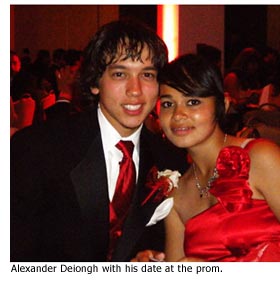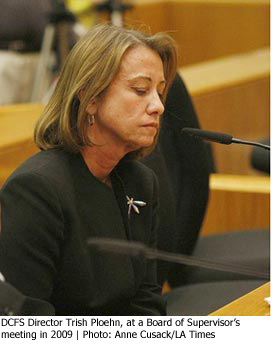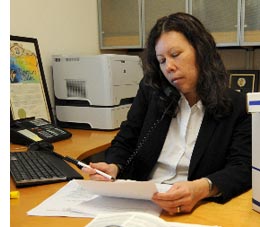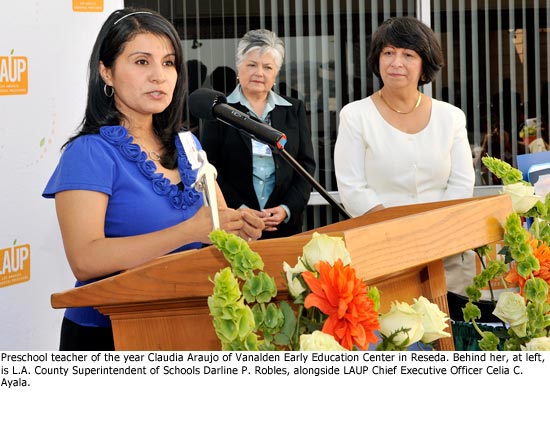Children and Families
Same-sex weddings on hold in county [updated]
August 5, 2010
 Same-sex couples hoping to tie the knot in Los Angeles County can’t say “I do” just yet.
Same-sex couples hoping to tie the knot in Los Angeles County can’t say “I do” just yet.
The Los Angeles Registrar-Recorder/County Clerk announced that it will not be performing any same-sex marriages until this week’s U.S. District Court judgment is formally entered.
U.S. District Chief Judge Vaughn R. Walker ruled Wednesday that California’s Proposition 8 barring same-sex marriages was unconstitutional. Proposition 8 proponents have asked Walker to stay his judgment until they can appeal. Parties in the case have until Friday to weigh in on the matter, after which the judge will decide to either formally enter his decision or stay it pending appeal.
County Clerk Dean Logan issued a press release saying that his office is “unable to expand our services to same sex couples until entry of the final judgment. We will continue to monitor any new developments and will take immediate action to implement the Court’s ruling once it becomes effective.”
Updates will be posted on the Registrar-Recorder/County Clerk’s website. Zev’s statement on Walker’s ruling is here.
Posted 8/5/10
Updated 8/12/10
U.S. District Judge Walker on Thursday refused to permanently stay his ruling overturning Proposition 8. But he did agree to give its sponsors until Aug. 18 to appeal his ruling to the U.S. 9th Circuit Court of Appeals, after which time same-sex marriages can again begin to take place.
Dean Logan, Los Angeles County’s Registrar-Recorder/County Clerk, said in a statement that, pursuant to the judge’s ruling, his office would “cease to enforce Proposition 8” after 5 p.m. on August 18 and would start to issue marriage licenses and perform civil marriages.
Logan said his office would extend regular office hours at designated county facilities to handle the expected surge of requests.
The Registrar-Recorder/County Clerk, he said, “will seek to meet customer demand for every qualified couple seeking a marriage license or a civil marriage ceremony at County facilities.”
Information on the extended hours of service will be available at www.lavote.net by Friday, Aug. 13 after 5 p.m. Marriage license information can be accessed online at www.lamarriage.lacounty.gov.
Zen and the art of preschool teaching
July 13, 2010
No longer are preschool teachers the unsung heroes of education, at least not in L.A. County. On Tuesday, the Board of Supervisors honored the winners of the third annual “Preschool Teacher of the Year Awards.” The six winners were picked by the non-profit Los Angeles Universal Preschool, or LAUP, whose goal is to ensure that every four-year-old in the county receives a high-quality preschool education.
“What all these teachers have in common is an unquestioned commitment and dedication to the children in their classrooms, where they go beyond the call of duty to provide their students with a quality early childhood education that will last a lifetime,” says LAUP Chief Operating Officer Celia C. Ayala.
This year’s Third District winner is head teacher Claudia Araujo of Vanalden Early Education Center in Reseda, where she also facilitates workshops for colleagues, leads meetings for parents on education and development and presents grant proposals. Among her many contributions, Araujo received a $2,500 grant to improve early literacy and math programs at the school and organized a parent lending library.
An interview with the soft-spoken and thoughtful Araujo quickly turned into a session that seemed as much about how to make an emotional connection with children as about how to create a curriculum for them. (For a video of Araujo in action, see below.)
Here’s a taste of what this teacher has learned along the way:
Winning is exciting, but naptime is even more important.
“I got a phone call at work… letting me know that I had won. I mean at first I couldn’t believe it, I was just ecstatic. The children were napping so I couldn’t be loud and I had to step outside and talk to her on the phone. It was really, really exciting.”
Follow your childhood passion.
“Ever since I was little, I always was fascinated with being a teacher, I would pretend to be a teacher, I would play teacher. I like that feeling you get when you are teaching somebody something. As a school girl I used to think this is a wonderful career, this is a wonderful thing to do.”
Be calm and have patience; children will listen.
“We do have children who come in with different challenges. And I see that in order to get across to that child, I will really have to understand the child, I will really have to talk to them. I have to be very calm. I have to be patient. Right away I start talking to the child in a way that’s really calm and really patient, letting him know that things are going to be fine. Sometimes people don’t understand that you have to talk to a child really calmly and when you do that the child responds.”
The best teachers are also students; education is a lifetime endeavor.
“Advice I would give new preschool teachers is to always be patient, get to know the children, and learn as much as you can with ongoing education. Every time you learn something in a class, then you see it at work and it becomes your own, it becomes your own technique. The more that you’re researching, the more that you’re learning. All those little things will help you in the classroom and will help you develop as a teacher, too.”
Be who you are and have fun.
“You want to have fun, be creative, be artistic. The children will love all that. If you are a dancer, dance with the children. Even if you aren’t a good dancer, even if you are moving, the children will love that. Sometimes you may think that you don’t have the right skills, but you already do. You just have to be able to say, I may not be perfect, but I’m willing to try.”
A teacher’s greatest reward is the success of her students.
“One of my former students came back and she was so excited showing me her 5th grade diploma. When she came in she gave me a hug and said, ‘Ms. Araujo, you were my first teacher!’ Her mother said, ‘You know I had to bring her, she wanted to take a picture with you and her diploma. She’s always thought of you as her very first teacher and you made such a positive influence on her.’ It was really emotional for me because it was so exciting to see that I make a difference.”
Success is rarely achieved alone.
“I am really excited and happy to have won this award because I do like teaching. But I’d also like to say as a teacher, you also need your staff and your paraprofessionals at your side with you. We’re able to work well together, we’re able to share lessons and talk about what our lesson plan is. And once you have that connection and know you are able to work as a team, then everything becomes easier because you know you have support.”

Posted 7/13/10
A graduation full of inspiration
June 7, 2010
Maria Burgos is on her way to the Ivy League. Five years ago, she was selling gum on the streets of Tijuana.
Maria was only 13 at the time, but she knew this was no life for her—mired in poverty, working long hours alongside a father who’d been deported to Mexico after a string of arrests in L.A. By then, she’d already been removed from her parents and returned to them several times, starting after her first birthday.
Begging and pleading, Maria convinced her parents to let her cross the border to stay with a family friend in Los Angeles, where she was born as a legal resident and wanted to attend school again. “I knew I couldn’t control all aspects of my life,” she recalls, “but I knew I could control my education. I just went for the A’s.”
So began a rocky journey that would land Maria in six foster homes by her freshman year, when she finally found stability and success in the care of a middle school counselor and her husband. This year, Maria graduated from Pioneer High School in Whittier with a 4.02 grade point average and has been accepted to Brown University in Rhode Island. The 18-year-old says she wants be a pediatrician.
“I never felt sorry for myself,” says Maria, who was captain of the varsity cross country team and has run four L.A. Marathons. “Being in foster care was so much better than being with my parents. I didn’t see it as an obstacle. I saw it as an opportunity.”
On Tuesday night, Maria and more than a hundred other foster youth will be honored for their academic achievements and awarded thousands of dollars in scholarships during a gala at Walt Disney Concert Hall. The event, “Celebration 2010,” is now in its 21st year and is largely organized by L.A. County’s Department of Children and Family Services and United Friends of the Children, a private group that helps foster youth successfully transition into adulthood. The evening’s host will be comedian Paul Rodriguez, with actress Jada Pinkett Smith as the keynote speaker.
“Insane challenges”
The young honorees are among the most extraordinary of graduates in this season of high school commencements. Still in their teens, they’ve suffered years of abuse and abandonment. They’ve bounced from one school to the next, creating gaps in their education. Too often, they’ve been told by grown-ups at home and in the classroom that they’ll never amount to much.
“They have this amazing resilience,” says Monica Bomkamp Enia, education program director for United Friends of the Children. “They go through these insane challenges and still come out on top.”
Frequently, she says, the successful students have someone in their lives—a teacher, a grandparent, a coach, a social worker—who has told them: “You can do this and I’m going to help you.” Sometimes, she says, they’re driven by nothing more than a powerful determination to prove people wrong.
“Our take,” Enia says, “is that there is no reason people should expect less from them.” She says her organization, founded by the late Nancy M. Daly, is dedicated to becoming the positive voice in the lives of foster children—and backing it up with logistical and financial support.
Forty students participating in Tuesday’s event will receive UFC scholarships of $15,000 spread across five years, along with help picking colleges and finding other funding sources. The others also will receive grants of various sizes from a variety of organizations. Of those who’ve previously participated in UFC’s college sponsorship program, more than 70% have graduated—an off-the-charts rate for foster youth.
Each student who’ll proudly stride across Disney Hall’s stunning stage has traveled a uniquely tortuous route to get there. But they all share this: a fierce determination, rooted in their difficult journeys, to build promising futures for themselves.
“Itching to go”
 Cynthia Lapos found her voice at Canyon High School.
Cynthia Lapos found her voice at Canyon High School.
As a member of the debate and speech team, she became one of California’s top competitors in oratorical interpretation—taking an existing speech and recreating the effect intended by the author.
“I can say things in a speech and the audience will believe me,” she says. “They’re not seeing me as someone who was abused for nine years. They’re viewing me as someone who is doing a great job.”
For years, Cynthia kept silent about her father’s alleged abuse. “I didn’t want the family to crumble and fall away,” she says. But her secret was revealed when her stepmother discovered a detailed letter Cynthia had written about her treatment and had stashed away, thinking she might someday be brave enough to give it to someone.
With no direct evidence against Cynthia’s father, who denied the abuse allegations, no charges were filed. Still, the discovery of the letter led to Cynthia’s placement at age 16 in a Canyon Country foster home with her best friend, a former foster youth who’d been adopted by the family.
“We kept our foster license open but we weren’t intending to have another child,” says Sheri Flay, who, with her partner Victoria Bennett, has been caring for Cynthia for two years. “It was just the right thing at the right time.”
In the aftermath of all this upheaval, Cynthia says “she fell into the deepest state of depression…I put all the blame on myself when I was the victim.” She worried that she was “tainted” and that people “wouldn’t want to be with me.” Nonetheless, she says, “I wouldn’t let myself drop below a 3.0.”
And she didn’t.
Cynthia, who turns 18 on Thursday, graduated from Canyon High School with a 3.31 grade point average. In the fall, she’ll be off to California State University at Northridge, where she’ll live on campus. “I’m itching to go,” she says. “College has been my dream.”
In an essay Cynthia wrote as part of the application process for Tuesday’s event, she put any doubters on notice: “I am someone who will not back down. I will not give up.”
“Bragging rights”
 Since the age of 10, Alexander Deiongh has lived in foster homes stretching from Fontana to Long Beach, seven in all. He says his birth mother was “great” to him and his brother, except when she didn’t take her medication for a bi-polar condition, which was often. “When she’s not on her medication,” he says, “she’s not worried about us.”
Since the age of 10, Alexander Deiongh has lived in foster homes stretching from Fontana to Long Beach, seven in all. He says his birth mother was “great” to him and his brother, except when she didn’t take her medication for a bi-polar condition, which was often. “When she’s not on her medication,” he says, “she’s not worried about us.”
Alexander remembers many times when police and social workers removed him and his brother from their Highland Park home after their mom vanished, leaving them to fend for themselves. Eventually, the court would reunite the family, but each time the story was the same.
The last time Alexander lived with his mother was in his sophomore year at Franklin High School. He and his brother were determined to keep her on track. “We thought we could ride it out and help her with her medication,” he says. But once again, she disappeared, this time to Las Vegas.
“We didn’t tell anyone because we didn’t want to be taken away again,” he says.
But someone did alert authorities and the boys were removed for the final time. They eventually were placed in separate homes after Alexander repeatedly complained that his brother was physically abusive. Since November, 2007, Alexander has lived in North Hollywood with a couple he says have provided him with the financial and emotional support he needed to excel.
“I’d like to say it’s all me,” the 18-year-old football player says of his success. “But it’s also the foster parents who guide you.”
In two weeks, Alexander will graduate from North Hollywood High School with a 3.65 grade point average. In the fall, he’ll be attending UCLA, focusing on math and the sciences.
He admits to being motivated by “bragging rights” because of the rough treatment he received from his brother, who was always critical of him and has not fared nearly so well. If Alexander saw him today, he says, he’d tell him off: “You criticized me the whole time and look at me and look at you!”
But that’s far from the whole of it.
“I knew that I didn’t want to spend my whole life on minimum wage jobs,” he said the other day after being fitted for a prom tuxedo. “I did not want to live up to a stereotype of what a foster kid is.”
Posted 6/07/10
More fixes ordered for child-welfare database
April 29, 2010
 Pushing to improve a key tool in child welfare investigations, the Board of Supervisors unanimously approved a motion Tuesday to increase the use and utility of a multi-departmental database for child social workers.
Pushing to improve a key tool in child welfare investigations, the Board of Supervisors unanimously approved a motion Tuesday to increase the use and utility of a multi-departmental database for child social workers.
The motion, authored by Supervisor Mark Ridley-Thomas, instructs the county CEO and other departments to make and track improvements to the Family and Children’s Index system over the next year.
The FCI system is a computer database that provides child welfare social workers with key medical, law enforcement and social services information, The system came under review last year after a series of high-profile deaths of children in county care prompted a new examination of potential holes in the child-welfare safety net.
County officials discovered that the FCI system was badly underutilized by county agencies, including the Department of Children and Family Services, its primary beneficiary. Supervisors agreed on ordering improvements, but opinion divided over whether the ultimate goal was to repair the FCI system or to scrap it for another computer-based system.
This week’s vote was an endorsement for reform rather than replacement.
“We are going to move full speed ahead” with reforming FCI, Supervisor Zev Yaroslavsky said at the conclusion of the discussion.
The motion also gives the CEO’s office 60 days to suggest ways to augment FCI using “best practices” from alternative systems in use elsewhere, provided they are legal in Los Angeles.
“This moves us forward in a way that doesn’t discard FCI, but augments it with the benefit of looking at other systems,” Ridley-Thomas told colleagues during the board meeting.
FCI is designed to be especially useful in the early stages of investigating child-welfare allegations, as emergency social workers prepare for a first visit to an at-risk child’s home.
Social workers need a quick, comprehensive way to understand the history of the family’s interactions with county agencies.
In the past, departments often failed to log relevant information, and some DCFS social workers did not check the database before launching investigations. Some departments hadn’t even completed memoranda of understanding about rules that would govern their work with FCI.
Last year, supervisors ordered county departments to begin aggressively implementing the system, including uploading more complete data and retraining staffers in its use. Training was completed in January, and FCI use has risen significantly. The number of “queries” rose from about 13,700 per month last summer to over 23,000 in March, according to FCI figures.
Still, problems remain that can’t be solved with technological fixes. The county is trying to resolve concerns over sharing certain information by working toward changes in state law and ways to keep in compliance with federal health-care privacy concerns.
“We need to have complete real-time information when we knock on that door,” Mike Ross, a supervising children’s social worker at DCFS in El Monte, told the board during Tuesday’s meeting.
Posted 4-29-10
New summer jobs for low-income youth
April 6, 2010
The Board of Supervisors on Tuesday voted to expand the county’s longstanding summer jobs program for young people, tapping federal stimulus dollars to create new opportunities for youths in a variety of low-income settings.
With the board’s action, county officials in the Departments of Public Social Services and Community and Senior Services will gain access to $11.7 million in new American Recovery and Reinvestment Act monies. That infusion is expected to boost the county’s Summer Youth Employment Program by as many as 15,000 new jobs.
The expansion—proposed in a motion by Supervisors Don Knabe and Zev Yaroslavsky—will target foster youth in low-income households, young adults aging out of the foster-care system, teens in CalWORKS households, teens on food stamps and emancipated foster youth aged 18-24 who are living in qualifying low-income households.
The summer jobs program is administered through the county’s Workforce Investment Boards, which are funded by the federal government. Information on WIB youth programs can be found here. And click here for a tentative list of ARRA summer youth employers in Los Angeles County.
4/6/2010
Foster homes to be investigated
March 30, 2010
 Responding to the brutal death of a two-year-old toddler, Los Angeles County’s child welfare chief on Tuesday promised a broad emergency examination of all foster home agencies under contract with the county, which are responsible for the well being of more than 5,800 children.
Responding to the brutal death of a two-year-old toddler, Los Angeles County’s child welfare chief on Tuesday promised a broad emergency examination of all foster home agencies under contract with the county, which are responsible for the well being of more than 5,800 children.
The goal, said Department of Children and Family Services Director Trish Ploehn, is to swiftly determine that there are “are no children left in danger.” She added: “For the children in foster homes, we are doing a 100 percent review.”
Ploehn, who’s been under fire for a series high-profile child deaths in recent months, told the Board of Supervisors that county social workers will visit 2,500 foster homes with a detailed “physical environment checklist” aimed at determining whether they share the type of unsafe and illegal conditions found in the South Los Angeles home where toddler Viola Vanclief died on March 4. The children themselves, Ploehn said, will be interviewed and asked, among other things, whether they’re being properly fed and how many adults reside in the home.
The review was requested in closed session last week by the supervisors after disclosures of Viola’s death, who, according to a newly released Coroner’s report, suffered blunt force trauma and extensive internal injuries. The homes that will be inspected are part of a network of Foster Family Agencies (FFA), paid by the county and primarily responsible for ensuring the safety of children in homes they oversee, including hiring independent social workers to conduct inspections.
On Tuesday, those 58 agencies were reduced by one.
Acting on a recommendation by Ploehn, the board unanimously voted to terminate the contract of United Care, the foster agency that had placed Viola in one of its 88 homes.
That home was run by Kiana Barker, a licensed foster parent who had been the subject of five earlier neglect or abuse complaints, including one in which it was determined that she’d neglected her own daughter. Barker had an earlier conviction for theft, but had succeeded in obtaining a state license.
She told police investigators that she’d accidentally struck Viola with a hammer while trying to free her from a bed frame in which she’d become tangled. Also living in the house was Barker’s boyfriend, James Julian, a convicted armed robber. Both were arrested on suspicion of murder in Viola’s death and released without charges, pending results of the continuing criminal probe.
Child welfare investigators turned up evidence at Barker’s home of apparent lax supervision by United Care.
The agency failed to notice, for example, that Julian was living there, a violation of state law because of his criminal record. Julian had tried and failed to obtain a license as a foster parent in 2007. He and Barker had a 6 month-old child together.
Appearing before the Board of Supervisors on Tuesday, United Care’s executive director, Craig Woods, said revocation of his contract would be a “premature rush to action” based in part on “grossly inaccurate” media accounts. “United Care has a stellar 21-year track record,” he said, “and this one event should not warrant the termination of our contract.”
Woods said that the social workers hired by his agency twice made surprise visits to the home in February and found no clothing or other evidence that Barker’s boyfriend was living there. Barker had also signed a sworn statement to that effect, United Care’s executive director said.
In an exchange with Supervisor Zev Yaroslavsky, Woods said he was unaware that padlocks had blocked access to some rooms in the home, contrary to foster home rules. Woods also said he did not know that several video cameras were stationed around the home. The purpose and precise location of the cameras were not clear.
Woods also insisted that Barker’s prior theft conviction should not be considered as part of the revocation. Many foster parents, he suggested, have obtained licenses despite non-serious criminal records. In fact, he contended that “as many as half” of foster parents in Los Angeles County have criminal records and were able to get exemptions from the state to get licenses.
But Gary Palmer of the state’s Department of Social Services said Wood’s number is “totally false.” Palmer, chief of the technical assistance and policy branch for community-care licensing, said the exemption figure in Los Angeles County is an average of 5 percent.
Under the emergency review, meanwhile, county social workers and auditors also will take a more comprehensive examination of a randomly-selected sample of about 600 homes that are overseen by Foster Family Agencies. This review will be conducted by social workers from the Department of Children and Family Services and representatives from the County Counsel and Auditor-Controller offices. Also participating will be agents from the state.
Ploehn promised that the investigation would be complete by early May and that she would come back to supervisors with data and recommendations by May 15.
Posted 3/30/10
New campaign takes aim at hunger
November 23, 2009
Hunger in Los Angeles County is visible to anyone who chooses to look closely.
For Supervisor Zev Yaroslavsky, that fact hit home again last week as he made one of his frequent drives past the SOVA food pantry near his house. “I’ve never seen a line there that long,” he said.
For Los Angeles Unified School District board member Steve Zimmer, it came last year in the actions of a boy he was tutoring in an after-school program in Northeast Los Angeles. Rather than devour an ice cream cup he’d earned as a prize, the youngster tucked it in his backpack to save for breakfast the next morning. “When you see that simple act of a six year old, it kind of hits you in the gut,” Zimmer said.
Stories and statistics of the rising tide of hunger in Los Angeles flowed Monday morning at a conference to launch Fed Up With Hunger, a major initiative to combat widespread hunger and malnutrition in L.A. The project of The Jewish Federation of Greater Los Angeles aims to combine government, private and corporate efforts to understand and combat a pervasive hunger that leaves more than one in eight L.A. area residents hungry every day. To expand awareness, the campaign produced a report entitled, “Hungry No More: A Blueprint to End Hunger in Los Angeles.”
The goal is ambitious—“not just to address hunger in Los Angeles but to actually solve it,” said Fed Up With Hunger Chairman Ron Galperin. In a video shot for the campaign, actress Debra Messing noted that hunger is so pervasive that “with one million people in our city hungry every day, it not them, it’s us.”
The project has three major aims:
• To declare Los Angeles a “Hunger-Free Zone.”
• To improve food assistance programs.
• To increase access to nutritious quality food.
The effort also encourages local officials to beef up existing hunger-fighting organizations and bring innovative approaches to the battle.
This week, Supervisor Yaroslavsky will introduce a motion directing county departments to “expand the reach of existing anti-hunger programs” and to “explore future goals and benchmarks” using the “Blueprint” report as a starting point. “We will use all of our resources and know-how” to attack hunger, Yaroslavsky said.
Los Angeles City Councilmember Paul Koretz pledged to help “bring visibility to an otherwise invisible issue” by introducing legislation to push city departments—from Parks and Recreation to the LAPD—to ways to identify and serve hungry populations.
One target of opportunity: signing up thousands of Los Angeles families who qualify for federal food assistance but haven’t signed up. Food stamps, for instance, can add $100 a month in groceries to a family’s kitchen. Zimmer, the school board member, suggested that neighborhood schools, which already sign up children for federal breakfast and lunch programs, could become focal points for signing up entire families.
Data shows that the need for these kinds of services is greater than it has been for decades. Food banks have reported a heavy demand as unemployment in Los Angeles has hit 12.7 percent and homes continue to fall into foreclosure. Since 2007, demand has spiked 85 percent at Jewish Family Service’s three SOVA food pantries, said Paul Castro, executive director of JFS.
Hunger issues are complex. Some aspects are easy to understand, such as families who simply can’t afford to feed their children and seniors who must choose between food, medication and rent. More difficult issues include how to end the problem of “food deserts,” poorer communities where high-quality food is scarce. Many communities have an overabundance of high-calorie junk food outlets but lack grocery stores that sell fresh fruits and vegetables. Obesity due to over consumption of nutrient-poor foods can also hit those who are going hungry, leading to diabetes.
One key partner in Fed Up With Hunger is MAZON: A Jewish Response to Hunger, a national anti-hunger group (Mazon means ‘food’ in Hebrew) based in West Los Angeles. At Monday’s event, MAZON Vice President Leslie Friedman announced the awarding of 10 “micro grants” to local hunger-fighting organizations. Among the recipients: the Valley Interfaith Council, Food Forward, Temple Emanuel and Jewish Family Service.
Stepping up oversight for troubled children
October 30, 2009
 In the wake of several high-profile deaths, the Board of Supervisors has taken steps to improve investigations and accountability at the Department of Children and Family Services and other agencies that intersect the lives of vulnerable youngsters. Two of those measures are focused on technology as a way to strengthen management oversight and improve communication among county agencies. A third aims to improve the diagnostic and forensic examinations of children allegedly abused or neglected.
In the wake of several high-profile deaths, the Board of Supervisors has taken steps to improve investigations and accountability at the Department of Children and Family Services and other agencies that intersect the lives of vulnerable youngsters. Two of those measures are focused on technology as a way to strengthen management oversight and improve communication among county agencies. A third aims to improve the diagnostic and forensic examinations of children allegedly abused or neglected.
Improved Communication: The supervisors, led by Zev Yaroslavsky and Michael D. Antonovich, directed county agencies to immediately start feeding information into and using a computer database created years ago to help social workers with child abuse and neglect investigations. A number of county agencies have not been participating in the system, called the Family and Children’s Index (FCI), as they’d previously agreed to do. Although in place for more than a decade, FCI has been “woefully underutilized,” says Yaroslavsky. But now the agencies have signed memos of understanding, and this month (November), all seven agencies directed to use FCI will ramp up toward full employment of the information-sharing system.
Enhanced Accountability: A new, automated alert system called SafeMeasures will allow DCFS to keep its supervisors better informed of—and more accountable for—cases in which the department has received multiple abuse allegations against a single family. E-mails will be sent to higher ups in the Emergency Response chain of command, for instance, when three or more referrals come in about the same family or when two are received in the same year. Similarly, when social workers determine that a preliminary investigation does not warrant opening a full-blown case, two layers of Emergency Response supervisors will be required to sign off. In addition, supervisors must be notified if social workers have not started an investigation within 15 days after DCFS receives an abuse or neglect allegation.
Broadened Medical Exams: To ensure thorough medical and psychological evaluations of potential victims of child abuse or neglect, the supervisors voted unanimously to look into expanding the categories of children who can be examined by the county’s own medical and psychological experts through the County’s Medical Hub system. Currently, these expert medical and mental health exams are available at the Hubs only after county officials have opened a dependency court case for a child based on suspected abuse or neglect. The new proposal would expand the rules to allow the Hub-based experts to examine children at the earliest stages of an investigation, giving social workers key information to help determine whether to file a case. At present, parents often pick local doctors to examine their children who may not have training in recognizing child abuse or neglect. The change might add another 23,000 exams at the Hubs, more than doubling the current 17,000 according to DCFS. Separately, the board wants to expand the county’s ability to perform forensic psychological and medical examinations of children for use in court cases. The plan would station forensic experts throughout all seven Hubs in the county, shortening travel times for traumatized children.
Investigating child deaths–and the system
October 19, 2009
Rose Belda hit the ground floor running.
Working from a basement office in the Hall of Administration, the newly hired chief of the Children’s Special Investigations Unit already had been directed by the Board of Supervisors to examine the deaths of 36 children. With no staff yet, she was doing her own photocopying of case files.
 Belda nodded towards a six-inch stack of confidential files she’d just run off about Lazhanae S., a 13-year-old charge of the Department of Children and Family Services who, in March, was stabbed to death in South L.A. after bolting from a DCFS-monitored foster home. “Here’s my reading for tonight,” Belda said.
Belda nodded towards a six-inch stack of confidential files she’d just run off about Lazhanae S., a 13-year-old charge of the Department of Children and Family Services who, in March, was stabbed to death in South L.A. after bolting from a DCFS-monitored foster home. “Here’s my reading for tonight,” Belda said.
Her workload won’t lighten anytime soon.
The board hired Belda in September as the unit’s lead attorney to investigate deaths and other “critical incidents” of abuse or neglect of children known to have had contact with the Department of Children and Family Services. She’ll advise the supervisors about needed improvements, offering advice about what works and what doesn’t.
Belda will also examine issues of accountability within children’s services, including whether appropriate disciplinary action was taken, as well as whether problems exist within the overlapping responsibilities of various county departments, including DCFS, probation, mental health and health services.
“Some of the system issues that need to be fixed are huge,” she says of her mandate. “They are not going to be fixed by small changes in policy – by adding a word here or there. I wish it were that easy.”
No doubt, Belda’s own work will be under the microscope, too. She begins her job after several high-profile deaths—and numerous critical news stories—have raised troubling questions about county services to kids in trouble.
In July, Dae’von B., 6, was found beaten to death after the boy had complained of abuse to teachers, health care staffers and social workers. His mother’s ex-boyfriend has been charged in the case. In that same month, preschooler Lars S. of Highland Park was decapitated by his mother, who killed herself, just months after county investigators looking into the mom’s mental health declined to remove the boy from her care. And two months later, In August, 19-month-old Jasmine G. died under mysterious circumstances while in county-supervised foster care.
Belda, 49, believes her experience as County Counsel’s legal advisor to DCFS since 2001 will give her an edge in investigating such tragedies. “Being an insider, I’m not coming in cold,” says Belda.
Belda says that, during her early years with the county representing the interests of children in dependency court, she saw up close the harm that can come to youngsters caught up in the system.
“I have a strong recall of a lot the cases that came in when the kids were really hurt,” says Belda. “In other [county] departments, when someone is asleep at the wheel, people don’t die. This is an area where the impact is so immediate and so quick and so swift. The kids can really get hurt…They need good people to step up for them.”
The mother of two teens, Belda lives in Hollywood with her husband, Superior Court Judge Victor Greenberg, who once held a similar post in the 1990s investigating child deaths as an inspector general in the Auditor Controller’s office.
The new post, which pays $193,000 annually, reports directly to the board.
DCFS Director Trish Ploehn called Belda an “excellent selection” and says she doesn’t believe Belda’s direct line to the supervisors will make adversaries out of her investigative unit and DCFS. “Hopefully,” Ploehn says, “the aim of my department, the board and the CSIU are all the same—find out what has gone wrong in tragic cases and find ways to fix the problems.”
Belda, asked whether she’s experienced any obstacles in her investigations so far, made a politic bow toward the cooperation she’s getting from DCFS and other departments.
“I haven’t found any big impediments,” she says. “All of the county departments have been helpful even when they know that I’m sort of targeting them. People have been, if not thrilled, super polite and super responsive. That’s a real positive.”














 405 bridge work causes a stink
405 bridge work causes a stink

